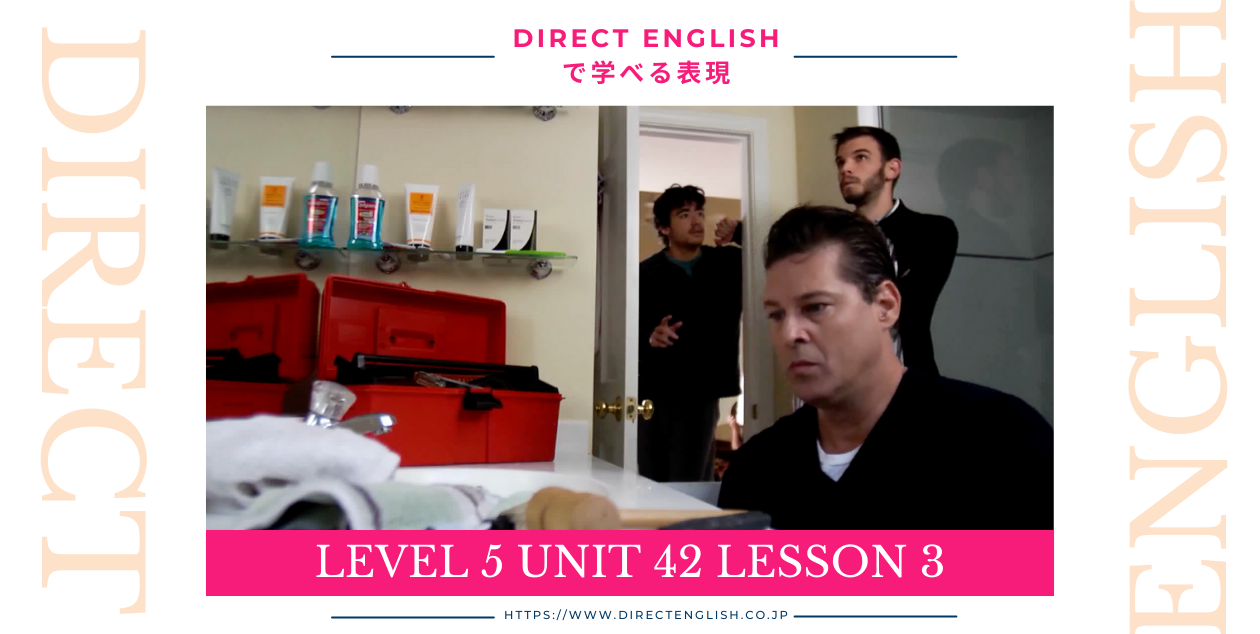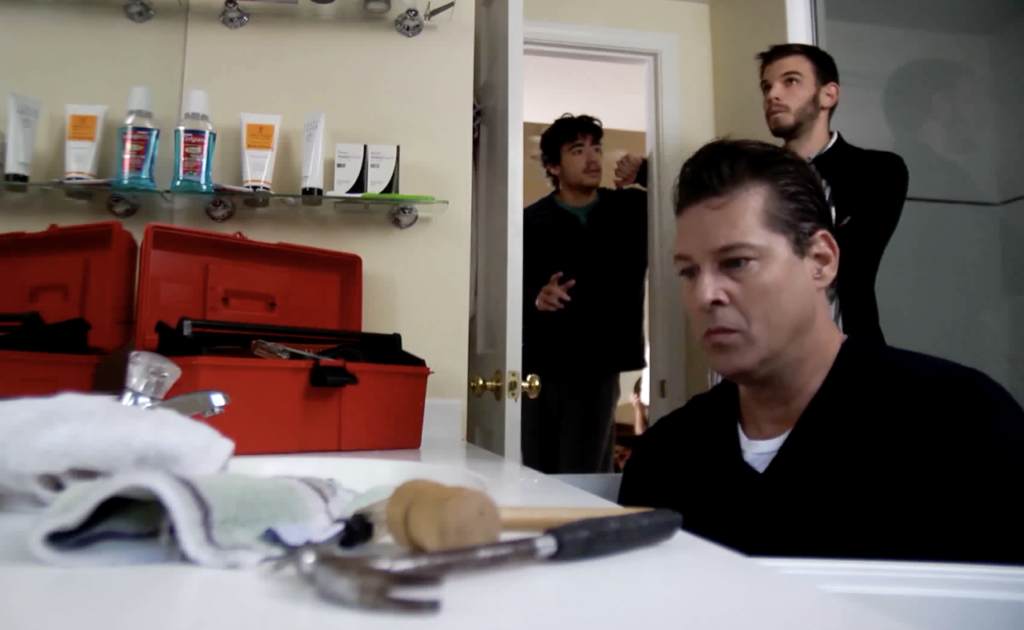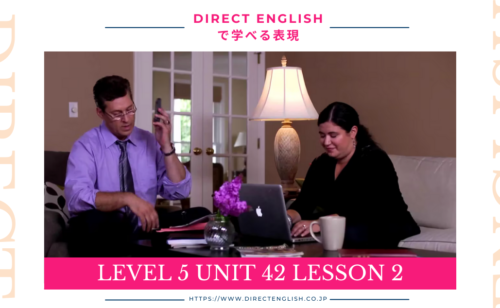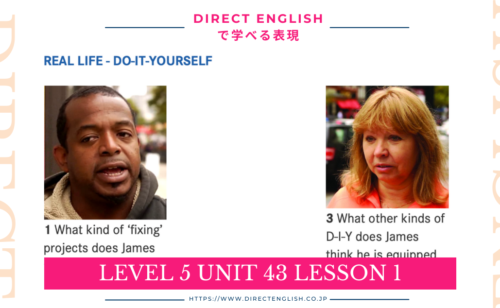
今回のレッスンでは、Richardが地下室に住むテナントであるDannyとMichaelを訪問する様子を通じて、日常生活や人間関係について学びます。Richardは地下室の漏水する蛇口を修理するために訪れますが、蛇口の問題が自然に解決するという意外な展開を見せます。
1. レッスン3の概要と登場人物
このレッスンでは、Richardが地下室を訪問する様子を通じて、日常生活や人間関係について学びました。学んだ表現を使って、自分の日常生活や問題解決について話してみましょう。例えば、「I wouldn’t have noticed the leak except that I’m trying to focus on my work and the dripping drives me crazy!」(私は仕事に集中しようとしているからこそ、その音が気になって気が狂いそうです。)のように使えます。

Situation:
Richard visits the apartment downstairs to take care of the dripping faucet.
Question:
Why is Danny particularly annoyed by the drip?
2. 重要表現解説:日常会話で使える頻出フレーズ
このシーンで登場する重要な英語表現を解説します。
- 1. I wouldn’t have noticed this except that I’m trying to fall asleep and the dripping drives me crazy!
-
意味:私は寝ようとしているからこそ、この音が気になって気が狂いそうです。
解説:仮定法過去完了形で過去の仮定を表し、「except that」は条件を示します。「drives me crazy」は「私を気が狂わせる」という強い感情を表します。
例文:I wouldn’t have noticed the noise except that I’m working from home and it distracts me.
(私は家で仕事をしているからこそ、その騒音が気になります。) - 2. We would have fixed it, but it says in the lease not to repair anything ourselves.
-
意味:私たちはそれを修理したかったですが、賃貸契約には私たち自身で修理しないようにと書かれています。
解説:仮定法過去完了形で過去の仮定を表し、「but」は対照を示します。「it says in the lease」は公式文書に書かれている内容を引用します。
例文:We would have painted the room, but the landlord said not to make any changes.
(私たちは部屋を塗り替えようとしたのですが、家主が何も変えないように言った。) - 3. It’s nothing a little tightening won’t fix.
-
意味:それは少し締めるだけで直るものです。
解説:「It’s nothing」は「それは何でもない」という意味で、「a little tightening」は「少し締めること」を指します。「won’t fix」は「直せないだろう」という意味で、ここでは否定形が使われています。
例文:It’s nothing a bit of cleaning won’t fix.
(それは少し掃除するだけで直るものです。) - 4. Maybe the washer is old—or missing?
-
意味:もしかするとワッシャーが古いのか、または無いかもしれません。
解説:「Maybe」は推測を表し、「the washer is old」は「ワッシャーが古い」という意味で、「or missing」は「または無い」という意味です。
例文:Maybe the battery is dead—or missing?
(もしかするとバッテリーが切れているのか、または無いかもしれません。) - 5. Well, that takes care of that!
-
意味:それで解決した!
解説:「Well」は文頭で使い、「that takes care of that」は問題が解決したことを示します。
例文:Well, that takes care of the paperwork!
(それで書類の問題は解決した!) - 6. Is there anything wrong with the water pressure?
-
意味:水圧に何か問題がありますか?
解説:疑問文で「Is there anything wrong with」は「~に何か問題がありますか」を尋ねます。
例文:Is there anything wrong with the internet connection?
(インターネット接続に何か問題がありますか?) - 7. Not that I’ve noticed.
-
意味:私が気づいた限りではありません。
解説:否定的な答え方の一つで、「Not that」は「~というわけではない」という意味です。
例文:Not that I’ve heard.
(私が聞いた限りではありません。) - 8. I feel stupid calling you for this.
-
意味:この件であなたに電話するのが馬鹿らしく感じます。
解説:「I feel stupid」は「私は愚かだと思います」という意味で、「calling you for this」は「この件であなたに電話する」という意味です。
例文:I feel stupid asking such a simple question.
(そんな簡単な質問を聞くのが馬鹿らしく感じます。) - 9. I’m glad I could help.
-
意味:私は助けることができたことを嬉しく思います。
解説:「I’m glad」は喜びや満足感を表し、「I could help」は過去の能力や可能性を示します。
例文:I’m glad I could be of assistance.
(私は助けることができたことを嬉しく思います。)
3. 「Fixing Things Around the House」というテーマで、短いエッセイを書いてみましょう。
ライティングのコツと準備方法
- 主題を決める:例えば「家で自分で修理すること」
- アウトラインを作成:主要なポイントを箇条書きにする
- 具体的な詳細を考える:DIY修理の経験や利点、欠点
- 学んだ表現を組み込む:レッスンで学んだフレーズを使用する
- 感情や雰囲気を描写する:読者が情景を想像できるようにする
ライティング見本
Title: Fixing Things Around the House
Fixing things around the house can be both rewarding and frustrating. On one hand, it saves a lot of money by not hiring professionals. For instance, when I fixed a leaky faucet, I only spent money on a new washer and some basic tools. It’s also convenient because you can work on your own schedule without waiting for someone else. Moreover, there’s a great sense of satisfaction in solving problems yourself.
However, DIY repairs can be time-consuming, especially if you’re learning as you go. When I was fixing the faucet, it took longer than expected because I had to watch several videos and figure out what parts I needed. There’s also a risk of making mistakes. If you’re not careful, you might cause more damage than you started with. Some repairs can be dangerous without the right knowledge and equipment.
In my experience, fixing the leaky faucet was ultimately rewarding, but it taught me that some jobs are best left to professionals. If the repair had been more complicated, I might have ended up causing more problems and spending even more money to fix my mistakes.
まとめ
このレッスンでは、Richardが地下室を訪問する様子を通じて、日常生活や人間関係について学びました。学んだ表現を使って、自分の日常生活や問題解決について話してみましょう。例えば、「I wouldn’t have noticed the leak except that I’m trying to focus on my work and the dripping drives me crazy!」(私は仕事に集中しようとしているからこそ、その音が気になって気が狂いそうです。)のように使えます。
ニケーションができるようになるでしょう。

